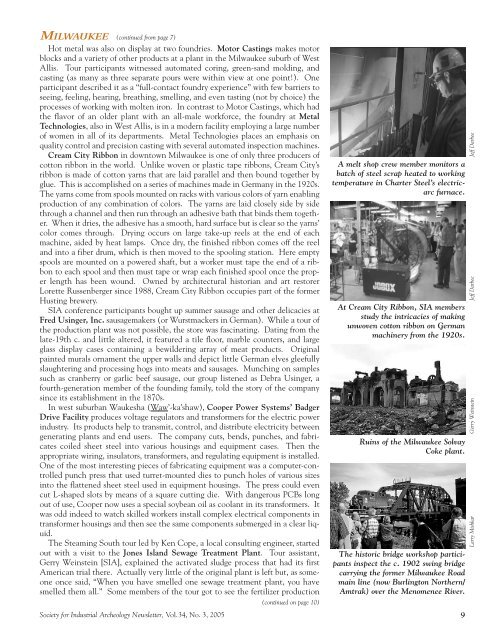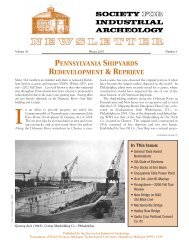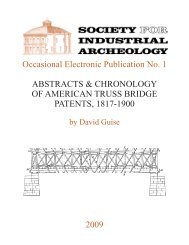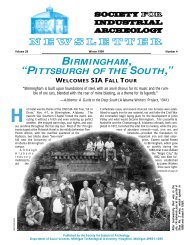SIAN - Society for Industrial Archeology
SIAN - Society for Industrial Archeology
SIAN - Society for Industrial Archeology
Create successful ePaper yourself
Turn your PDF publications into a flip-book with our unique Google optimized e-Paper software.
MILWAUKEE (continued from page 7)<br />
Hot metal was also on display at two foundries. Motor Castings makes motor<br />
blocks and a variety of other products at a plant in the Milwaukee suburb of West<br />
Allis. Tour participants witnessed automated coring, green-sand molding, and<br />
casting (as many as three separate pours were within view at one point!). One<br />
participant described it as a “full-contact foundry experience” with few barriers to<br />
seeing, feeling, hearing, breathing, smelling, and even tasting (not by choice) the<br />
processes of working with molten iron. In contrast to Motor Castings, which had<br />
the flavor of an older plant with an all-male work<strong>for</strong>ce, the foundry at Metal<br />
Technologies, also in West Allis, is in a modern facility employing a large number<br />
of women in all of its departments. Metal Technologies places an emphasis on<br />
quality control and precision casting with several automated inspection machines.<br />
Cream City Ribbon in downtown Milwaukee is one of only three producers of<br />
cotton ribbon in the world. Unlike woven or plastic tape ribbons, Cream City’s<br />
ribbon is made of cotton yarns that are laid parallel and then bound together by<br />
glue. This is accomplished on a series of machines made in Germany in the 1920s.<br />
The yarns come from spools mounted on racks with various colors of yarn enabling<br />
production of any combination of colors. The yarns are laid closely side by side<br />
through a channel and then run through an adhesive bath that binds them together.<br />
When it dries, the adhesive has a smooth, hard surface but is clear so the yarns’<br />
color comes through. Drying occurs on large take-up reels at the end of each<br />
machine, aided by heat lamps. Once dry, the finished ribbon comes off the reel<br />
and into a fiber drum, which is then moved to the spooling station. Here empty<br />
spools are mounted on a powered shaft, but a worker must tape the end of a ribbon<br />
to each spool and then must tape or wrap each finished spool once the proper<br />
length has been wound. Owned by architectural historian and art restorer<br />
Lorette Russenberger since 1988, Cream City Ribbon occupies part of the <strong>for</strong>mer<br />
Husting brewery.<br />
SIA conference participants bought up summer sausage and other delicacies at<br />
Fred Usinger, Inc. sausagemakers (or Wurstmackers in German). While a tour of<br />
the production plant was not possible, the store was fascinating. Dating from the<br />
late-19th c. and little altered, it featured a tile floor, marble counters, and large<br />
glass display cases containing a bewildering array of meat products. Original<br />
painted murals ornament the upper walls and depict little German elves gleefully<br />
slaughtering and processing hogs into meats and sausages. Munching on samples<br />
such as cranberry or garlic beef sausage, our group listened as Debra Usinger, a<br />
fourth-generation member of the founding family, told the story of the company<br />
since its establishment in the 1870s.<br />
In west suburban Waukesha (Waw’-ka’shaw), Cooper Power Systems’ Badger<br />
Drive Facility produces voltage regulators and trans<strong>for</strong>mers <strong>for</strong> the electric power<br />
industry. Its products help to transmit, control, and distribute electricity between<br />
generating plants and end users. The company cuts, bends, punches, and fabricates<br />
coiled sheet steel into various housings and equipment cases. Then the<br />
appropriate wiring, insulators, trans<strong>for</strong>mers, and regulating equipment is installed.<br />
One of the most interesting pieces of fabricating equipment was a computer-controlled<br />
punch press that used turret-mounted dies to punch holes of various sizes<br />
into the flattened sheet steel used in equipment housings. The press could even<br />
cut L-shaped slots by means of a square cutting die. With dangerous PCBs long<br />
out of use, Cooper now uses a special soybean oil as coolant in its trans<strong>for</strong>mers. It<br />
was odd indeed to watch skilled workers install complex electrical components in<br />
trans<strong>for</strong>mer housings and then see the same components submerged in a clear liquid.<br />
The Steaming South tour led by Ken Cope, a local consulting engineer, started<br />
out with a visit to the Jones Island Sewage Treatment Plant. Tour assistant,<br />
Gerry Weinstein [SIA], explained the activated sludge process that had its first<br />
American trial there. Actually very little of the original plant is left but, as someone<br />
once said, “When you have smelled one sewage treatment plant, you have<br />
smelled them all.” Some members of the tour got to see the fertilizer production<br />
<strong>Society</strong> <strong>for</strong> <strong>Industrial</strong> <strong>Archeology</strong> Newsletter, Vol.34, No. 3, 2005<br />
(continued on page 10)<br />
A melt shop crew member monitors a<br />
batch of steel scrap heated to working<br />
temperature in Charter Steel’s electricarc<br />
furnace.<br />
At Cream City Ribbon, SIA members<br />
study the intricacies of making<br />
unwoven cotton ribbon on German<br />
machinery from the 1920s.<br />
Ruins of the Milwaukee Solvay<br />
Coke plant.<br />
The historic bridge workshop participants<br />
inspect the c. 1902 swing bridge<br />
carrying the <strong>for</strong>mer Milwaukee Road<br />
main line (now Burlington Northern/<br />
Amtrak) over the Menomenee River.<br />
9<br />
Jeff Darbee<br />
Jeff Darbee<br />
Gerry Weinstein<br />
Larry Mishkar






